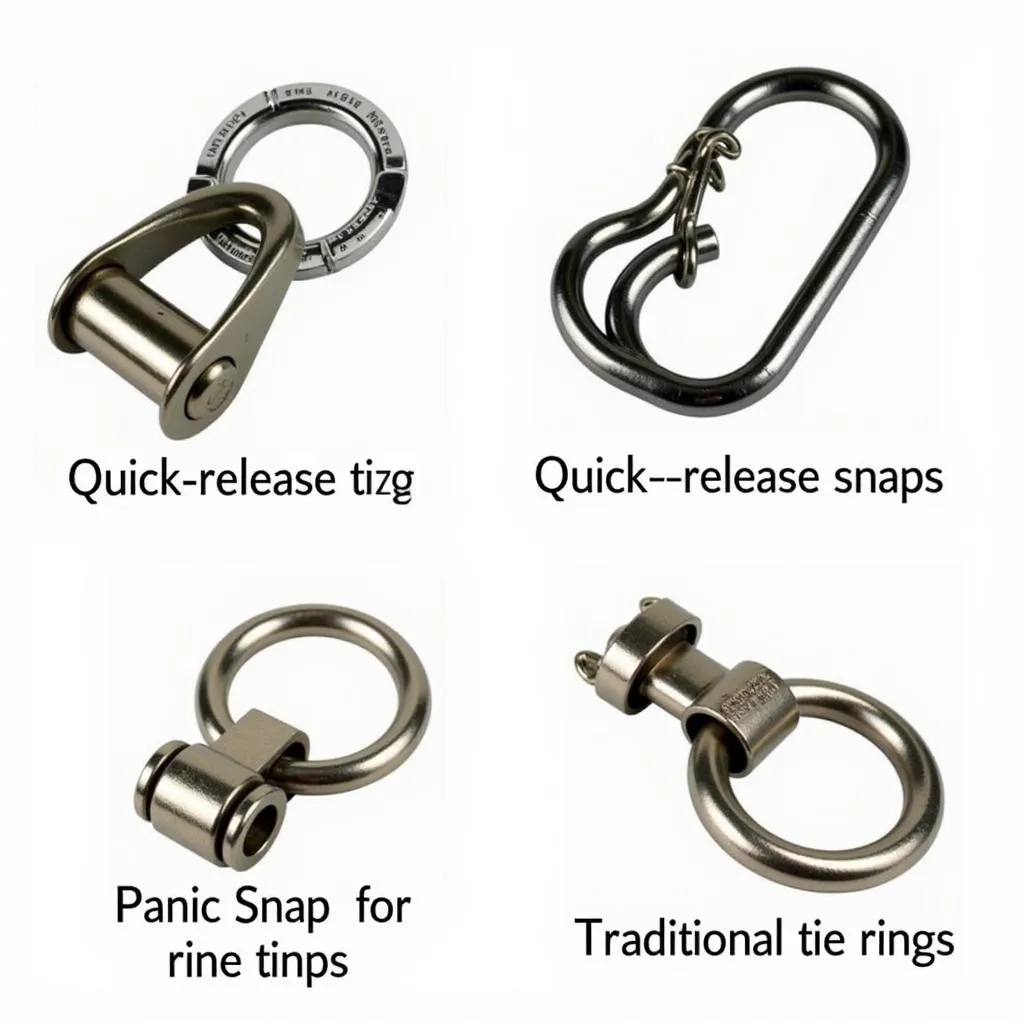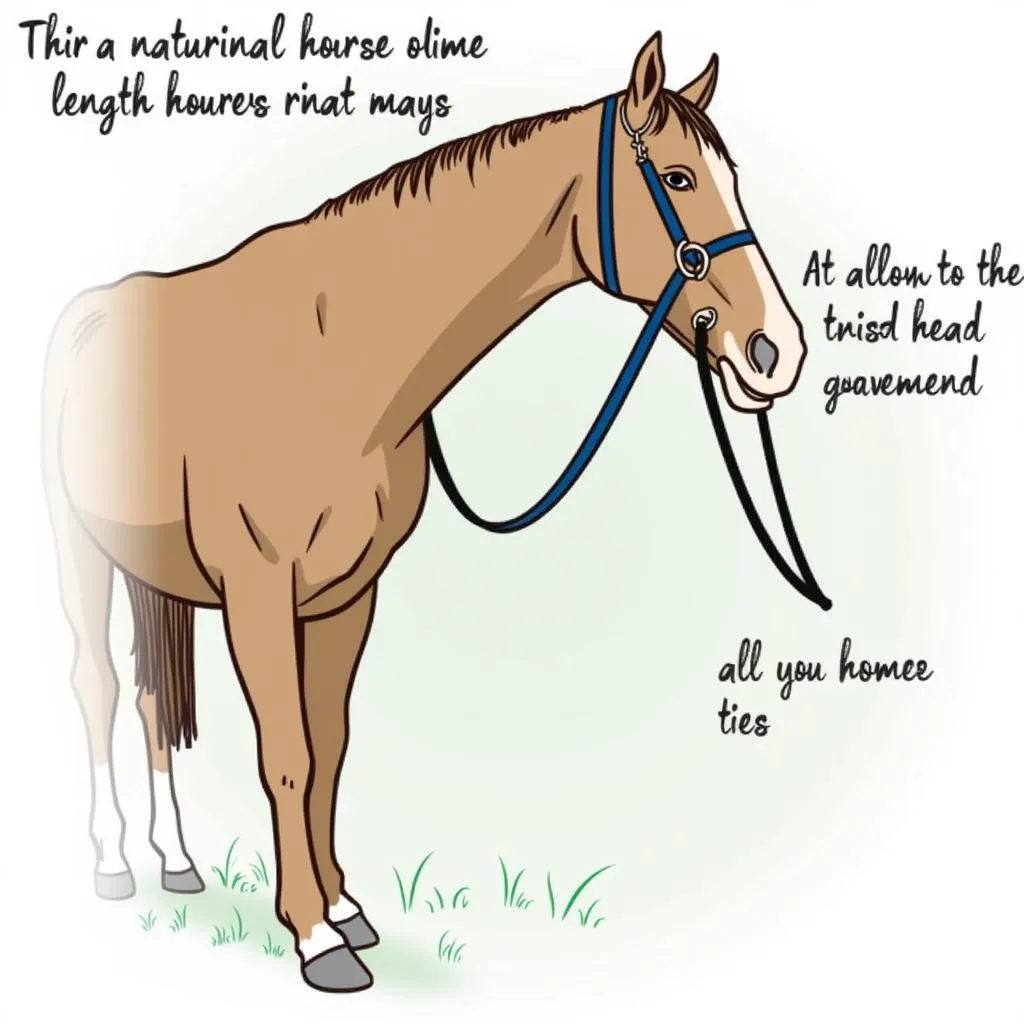When it comes to transporting your equine partner, safety and comfort should be your top priorities. A crucial, often overlooked aspect of safe trailering is the choice of Trailer Horse Ties. These seemingly simple pieces of equipment play a vital role in securing your horse and ensuring a smooth, stress-free journey.
 Types of Trailer Horse Ties
Types of Trailer Horse Ties
Understanding the Importance of Trailer Horse Ties
Trailer horse ties serve as a lifeline for your horse during transportation. They prevent sudden movements that can lead to injury, especially during unexpected stops or turns. Properly fitted ties provide a sense of security and stability, minimizing anxiety and the risk of your horse trying to break free.
Types of Trailer Horse Ties: Finding Your Perfect Match
The market offers a variety of trailer horse ties, each with its own set of advantages and disadvantages. Choosing the right type depends on your horse’s temperament, your personal preference, and the specific requirements of your trailer.
1. Quick-Release Snaps: Efficiency and Ease of Use
As the name suggests, quick-release snaps allow for swift and effortless tying and untying of your horse. These are particularly beneficial in emergency situations where every second counts. However, ensure the snaps are sturdy and reliable to prevent accidental release.
2. Panic Snaps: Prioritizing Safety and Peace of Mind
Panic snaps are designed to release under pressure, ensuring your horse’s safety in case of a fall or panic. They offer an added layer of security, but it’s crucial to choose a reliable brand with a proven track record.
3. Traditional Tie Rings: A Time-Tested Classic
Tie rings are a traditional and straightforward option, offering a secure point to attach your horse’s lead rope. While they lack the quick-release feature of snaps, their simplicity and durability make them a popular choice for many horse owners.
 Adjusting Horse Trailer Tie Length
Adjusting Horse Trailer Tie Length
Factors to Consider When Choosing Trailer Horse Ties
Selecting the right trailer horse ties involves considering several factors to ensure a safe and comfortable experience for your equine companion.
1. Material Matters: Durability and Strength
Trailer horse ties are available in various materials, including leather, nylon, and rope. Opt for durable materials that can withstand the rigors of travel and resist wear and tear.
2. Length and Adjustability: Finding the Right Fit
The length of the tie is crucial for your horse’s comfort and safety. It should be adjustable to allow for natural head movement while preventing them from lowering their head too far or getting a leg caught.
Hydroxyzine powder for horses can help manage anxiety during transportation. However, always consult with your veterinarian before administering any medication.
3. Ease of Use: Simplifying the Trailering Process
Choose ties that are easy to attach and detach, especially if you frequently travel alone. Quick-release or panic snaps can be beneficial in such situations.
4. Safety Features: Putting Your Horse’s Well-being First
Prioritize safety features like break-away points or panic snaps, particularly if you have a horse prone to anxiety or panic during transport.
5. Trailer Compatibility: Ensuring a Secure Setup
Ensure the ties you choose are compatible with your trailer’s tie rings or tie points. Check the size and attachment mechanism for a secure fit.
Trailer Horse Tie Maintenance: Extending the Lifespan
Just like any other piece of horse equipment, trailer horse ties require regular maintenance to ensure their longevity and functionality. Inspect the ties regularly for signs of wear and tear, such as fraying, cracks, or damage to the hardware. Clean them according to the manufacturer’s instructions, using appropriate leather conditioners or cleaners for specific materials. Replace any damaged or worn-out ties promptly to avoid potential safety hazards.
Conclusion: Equipping Your Trailer for Safe and Comfortable Journeys
Choosing the right trailer horse ties is a crucial aspect of responsible horse ownership. By carefully considering the factors discussed above, you can select ties that prioritize your horse’s safety, comfort, and well-being during transportation. Remember, investing in high-quality ties and practicing proper trailering procedures will contribute to a positive and stress-free experience for both you and your equine partner.
FAQs about Trailer Horse Ties
1. How long should my trailer horse ties be?
The ideal length allows your horse to stand comfortably with their head slightly lower than their withers. They should be able to move their head naturally without being able to get a leg over the tie.
2. Are quick-release ties safe for trailering?
When used correctly and checked regularly, quick-release ties can be a safe and convenient option. Choose a reputable brand with sturdy hardware.
3. Should I use two ties or one when trailering my horse?
Using two ties, one on each side, provides more stability and prevents your horse from turning around in the trailer.
4. How often should I replace my trailer horse ties?
Inspect them regularly and replace them at the first sign of significant wear and tear.
5. Can I use regular lead ropes as trailer ties?
It’s not recommended. Lead ropes are typically not designed for the stress of trailering and may not have the same safety features as dedicated trailer ties.
Related Resources:
For more information on horse care and trailering, check out these articles:
- Cross Border Horse
- Average Weight of a Quarter Horse
- How Much Does a 2 Horse Trailer Weight
- Everything You Need for a Horse
If you have any further questions or need assistance choosing the right trailer horse ties for your needs, feel free to reach out to us.
Contact Justus Horses USA:
Phone: 0772127271
Email: [email protected]
Address: QGM2+WX2, Vị Trung, Vị Thuỷ, Hậu Giang, Việt Nam
Our dedicated team is available 24/7 to assist you with all your equine needs.